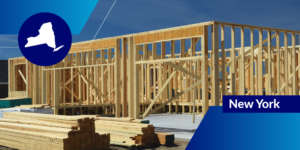
The volatile price of lumber has struck again, leaving a long-standing supplier-contractor partnership in shambles: In a lawsuit filed late last month, New York lumber supplier Barnett Forest, LLC sued Bollinger Construction, Inc. after the Maryland contractor allegedly broke multiple purchase agreements worth almost $7 million.
Court documents claim Bollinger operated in “bad faith” and reneged on its orders with Barnett in order to seek cheaper materials from other suppliers once the price of lumber began to fall last summer.
Volatile lumber prices are a friction point between suppliers and contractors
Construction material prices have been incredibly turbulent over the past couple years. The global pandemic put enormous pressure on supply lines while simultaneously boosting demand in certain sectors, creating imbalances across the industry. As a result, construction costs have spiked at rates not seen since 1970.
Lumber has been particularly volatile. Pre-COVID, contractors might have expected to see lumber priced between $300-$400 per 1,000 board feet. In mid-2020, the price skyrocketed, eventually reaching a high of $1,686 in the spring of 2021 — an increase of over 320% year-over-year — before collapsing back down to roughly $500 last summer.
The price of lumber has continued to fluctuate, preventing contractors from establishing a reliable new “normal” price point. As such, it has been a major challenge for suppliers to price materials for purchase orders. Without contractual safeguards in place, price swings can result in both huge losses and missed profits for suppliers and purchasers.
This is precisely what happened between Barnett and Bollinger last summer. Despite the two firms working together without issue on 51 separate projects worth roughly $28 million since 2016, the economic strain caused by the global pandemic proved to be too great to resolve amicably.
Barnett began to feel the pressure of the rising cost of lumber in late 2020 when it agreed to honor existing purchase orders with Bollinger for five separate projects at an “ever-increasing loss.” By this point, the price of lumber was just months away from spiking to its all-time-high.
According to court documents, between October 2020 and March 2021, Barnett supplied lumber for these five projects with Bollinger totalling roughly $5.1 million at rates that exceeded the binding purchase order price. As a result, Barnett sustained losses of over $2.2 million.
Barnett was set to supply lumber for two more projects: Purchase orders for a Virginia project known as “Arrowbrook” and a Maryland project known as “West Side Shady Grove” were executed in May and June 2021, respectively, for a combined $6.9 million.
But in June 2021, the price of lumber collapsed. As court documents highlight, in just two short months, the value of lumber dropped from nearly $1,686 per 1,000 board feet in May down to approximately $490 in June.
With market prices now well below the price listed on the purchase order with Bollinger, Barnett now had the opportunity to “finally turn a profit and make back substantial losses,” that it had sustained over the previous months.
Within weeks of the price drop, however, Bollinger began demanding unusual assurances from Barnett. Court documents suggest Bollinger was suddenly doubtful of Barnett’s ability to meet its orders and deliveries, “despite [Barnett’s] substantial compliance to date with all previous contractual obligations.”
Barnett had multiple calls with Bollinger to assure the contractor of its capacity to meet orders as contracted, but by late July, Bollinger evidently began rejecting deliveries.
Bollinger then notified Barnett that it had purchased “replacement” materials from alternate suppliers, presumably at lower prices, and would no longer honor purchase agreements for the Arrowbrook and Shady Grove projects.
Barnett’s suit alleges the unusual and unreasonable demands Bollinger introduced in July 2021 were made “in bad faith in an attempt to claim that Barnett was noncompliant with its obligations… so that Bollinger could cancel the Arrowbrook and Shady Grove Order Acknowledgements, and go back to market to try and cut expenses on lumber materials.”
Court documents allege Bollinger breached the two order acknowledgements, and Barnett is seeking damages totalling $3.3 million for the two projects.
Material price volatility will continue to be a challenge for construction professionals
This isn’t the first time fluctuating lumber prices have led to legal disputes. Just this past March, North Carolina supplier BMC West sued contractor Vision Construction Group over an almost identical scenario.
According to court documents, Vision Construction failed to accept an $800,000 delivery of lumber from BMC West after lumber prices fell by nearly 67% last summer. Vision Construction is alleged to have instead found an alternate supplier at much lower rates, violating the purchase orders it had with VBMC West, which led to the lawsuit.
These stories are evidence that price swings can hurt in both directions — and can be a major friction point between contractors and suppliers.
Including certain protections such as escalation clauses can go a long way to mitigate risk for both owners and bidders when prices are volatile.
“Escalation clauses can work both ways (upstream and downstream),” says construction attorney Alex Benarroche. “So, there’s potential to include de-escalation provisions that will lower the price if the cost of materials drops. Those situations can really create a win-win and a fair allocation of risk.”